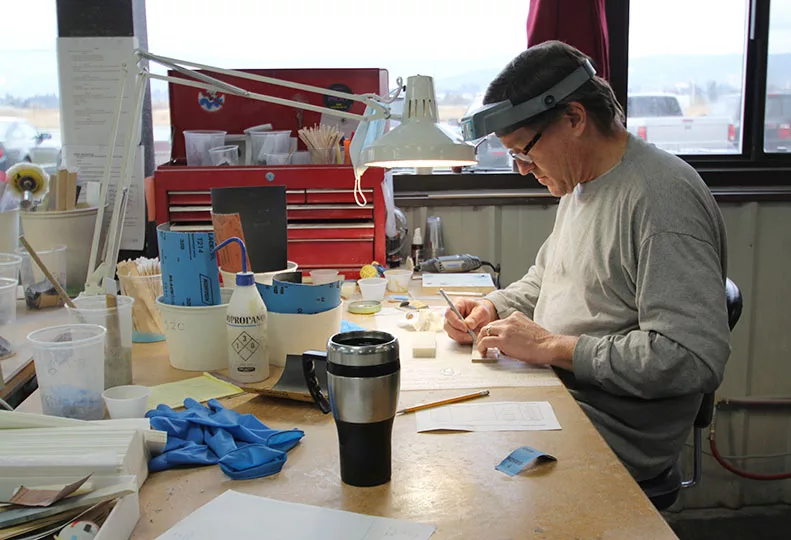Liberty Lake prototyping shop crafts steady growth
Proto Technologies adds equipment, clients as revenue climbs

Proto Technologies Inc., a Liberty Lake prototype manufacturer, has experienced growth this year in revenues and its client base, says Rory Nay, the company's president.
The company, located at 22808 E. Appleway, makes custom parts, models, patterns, and molds that its clients work with in the course of refining a concept into a physical product. Its clients serve industries that include aerospace, health care, electronics, and manufacturing.
The company also is adding new equipment, including three pieces purchased in the past year, and it currently is hiring a handful of new employees to bring the total number to 47 workers.
"Our revenues are increasing all the time," Nay says, declining to be more specific.
Nay says the company has employed between 45 and 50 workers since 2011, depending on customer work flow. She says it typically does prototyping work for large companies, including Bethesda, Md.-based Lockheed Martin Corp.; Redmond, Wash.-based Microsoft Corp.; and Seattle-based Starbucks Corp.
The company's customers are based mainly in the Pacific Northwest, including in Seattle, Portland, and Canada, but also across the U.S.
"Our customers are growing in terms of acquiring new customers," Nay adds. "We do have repeat business."
"We do a lot of work for Starbucks," Nay says, which includes work on components for the company's large industrial espresso machines used in its coffee shops.
She adds that Proto Technologies' business model doesn't involve mass production of parts, but instead involves refining prototypes and sometimes making smaller quantities of parts.
Additionally, Proto Technologies is working to achieve an aerospace certification by the end of 2014, called AS9100, which that industry uses as a standardized quality management system. The company expects the certification to bolster the amount of work it receives, Nay says.
"We work with aerospace companies that love us, and they likely will give us more work when we have the certification," she says. "Some companies, such as Airbus, won't give you any contracts unless you are AS9100 certified."
She adds, "With all the growth in aerospace, we thought it would behoove us to get that aerospace certification."
The company also has another tie to the aerospace industry, as one of several Spokane-area companies working with a Washington state apprenticeship program called the Aerospace Training Initiative, led by the Aerospace Joint Apprenticeship Committee. The program combines on-the-job training with supplemental instruction to teach advanced manufacturing skills.
Nay says four people are working at Proto Technologies under the AJAC program, which offers four years of training and education.
Meanwhile, the company's new equipment includes a computer numerical control (CNC) machine that offers five-axis rotation for machining, as opposed to many CNC machines that only enable up to four-axis rotation for machining parts. The shop also has two 3-D printers, among other equipment.
"Having fifth-axis speeds up our productivity," Nay says. "We also added fifth-axis ability to one of our existing CNC machines."
Nay and her husband, Greg, own the 40,000-square-foot building in which Proto Technologies occupies half. She says the remaining space currently is available for lease.
Nay says she is the sole owner of Proto Technologies, which was founded in 1995, although her husband also works there as vice president of operations. As a woman-owned company, Proto Technologies has garnered federal contracts, Nay says.
"We expect to do more," she adds.
Nay says she serves on a Spokane Public Schools advisory board for continuing technical education, and is a 2010-2012 past member of the Greater Spokane Incorporated board. She says she often talks to people about the educational options available to job seekers here that will help them find rewarding employment.
"There are many good-paying jobs that kids can start after a two-year degree that may be more technical," she says, including jobs as machinists after gaining a two-year certificate from Spokane Community College in East Spokane or North Idaho College in Coeur d'Alene.
Proto Technologies typically hires experienced machinists and employs many journey-level machinists, because of high-quality work required for such customers as Lockheed Martin, Nay says. However, she adds that the Spokane area has a shortage of machinists.
"That's why I'm growing my own," Nay adds, referring to the Aerospace Joint Apprenticeship training.
Related Articles
Related Products

_c.webp?t=1763626051)

_web.webp?t=1764835652)
